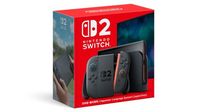Nintendo is facing an overwhelming demand for its upcoming console, the Nintendo Switch 2, with President Shuntaro Furukawa announcing on April 23, 2025, that approximately 2.2 million applications were submitted for the first lottery sale at the My Nintendo Store. This number is significantly higher than the company had anticipated, leading to concerns about the ability to fulfill orders when the console launches on June 5, 2025.
Furukawa expressed his apologies for the situation, stating, "We deeply apologize for not being able to meet expectations if applicants are not selected." He explained that despite the company's efforts to procure parts and ramp up production ahead of the launch, the level of interest has exceeded their forecasts. As a result, many applicants may find themselves disappointed when the lottery results are announced on April 24, 2025.
To address the high demand, Nintendo has announced that those who do not win in the first lottery will automatically be entered into a second lottery sale. However, even with this measure, Furukawa cautioned that it would still be challenging to deliver units to all applicants by the release date. He stated, "We have prepared in advance, but we cannot meet everyone’s expectations."
The company is actively working to strengthen its production system in response to this unexpected demand surge. Furukawa noted, "We plan to continue producing and shipping a considerable number in the future," highlighting Nintendo's commitment to increasing output to satisfy consumer interest.
As for the sales strategy, the initial lottery results will be revealed on April 24, with reservations set to begin at various retailers across Japan on the same day. This includes both physical game stores and online platforms, marking a significant step in making the Nintendo Switch 2 accessible to a wider audience.
Interestingly, while Japan has seen a staggering 2.2 million applications, the situation in the United States presents its own challenges. Due to the Trump administration's fluctuating tariff policies, Nintendo has postponed the reservation acceptance for the U.S. market. The acceptance is now scheduled to begin on April 24, 2025, aligning with the Japanese launch.
Reports suggest that Nintendo may expedite shipments of the Switch 2 units produced in Asia to the U.S. during the 90-day grace period announced by the Trump administration. This strategy aims to minimize the impact of potential tariffs that could significantly affect pricing. The retail price of the Switch 2 in the U.S. is set at $449.99, but a 46% tariff on imports from countries like Vietnam could compel Nintendo to raise prices globally.
Given that the U.S. is the largest gaming market in the world, it makes sense for Nintendo to allocate a larger share of Switch 2 units to this region compared to others. However, this also means that the availability of units in Japan may be limited, creating a sense of uncertainty about when consumers can purchase the console without relying on lottery systems.
As April 24 approaches, retailers are preparing for the influx of customers eager to secure their Nintendo Switch 2. Some stores have already set specific conditions for reservations. For example, Bic Camera will only accept applications from customers who have a credit card contract and a purchase history of at least 30,000 yen in the past year. Additionally, customers will need to present a photo ID in-store.
Similar conditions have been observed with other gaming products, such as the PlayStation 5, which has also faced supply shortages. Retailers like Yodobashi Camera have implemented criteria like requiring ownership of a Gold Point Card and a lack of prior purchase history for the same model.
As the gaming community eagerly awaits the Nintendo Switch 2, the company is making every effort to balance demand with production capabilities. Furukawa's statements reflect a commitment to transparency and consumer engagement, as Nintendo navigates these challenges in the lead-up to one of its most anticipated product launches.
In summary, the excitement surrounding the Nintendo Switch 2 is palpable, but the realities of production and distribution are proving to be complex. As Nintendo works to meet the high expectations of its fans, the situation serves as a reminder of the challenges faced by companies in a rapidly evolving market.







